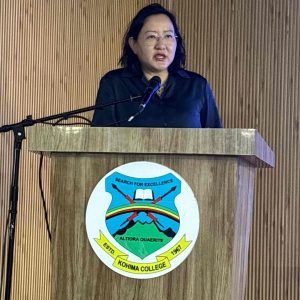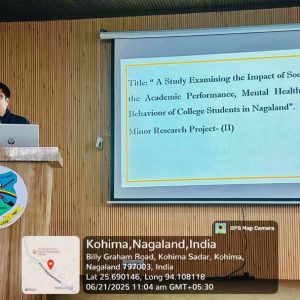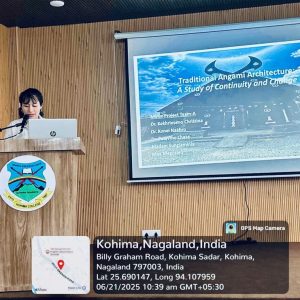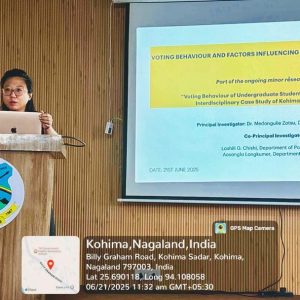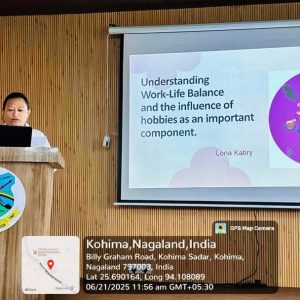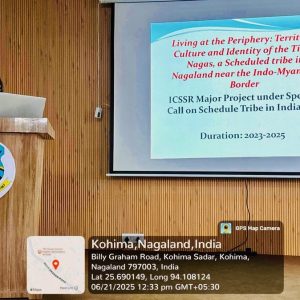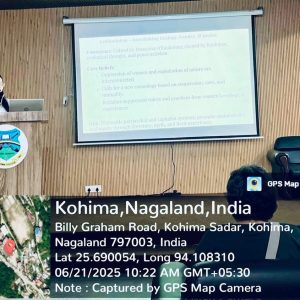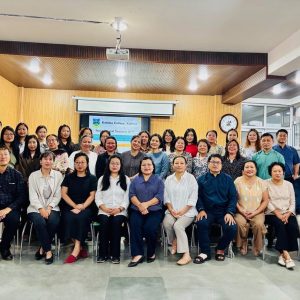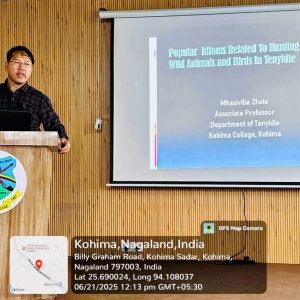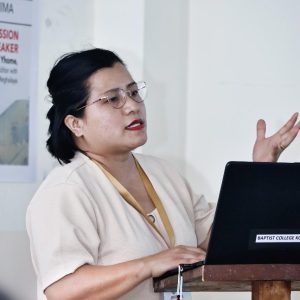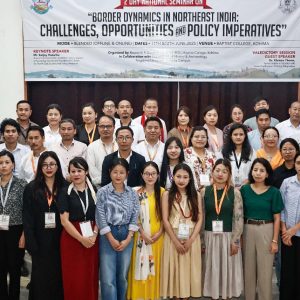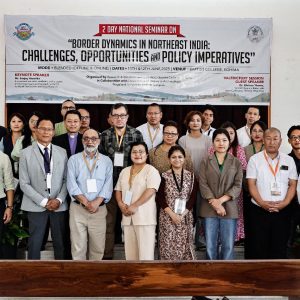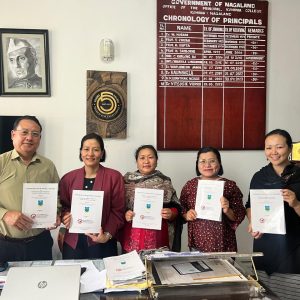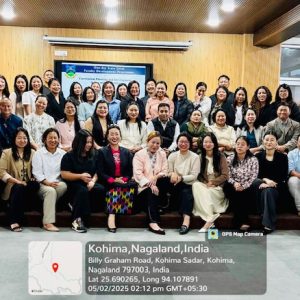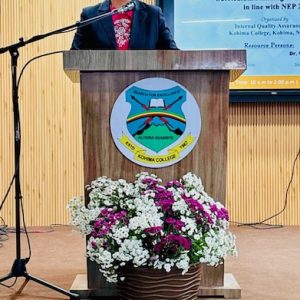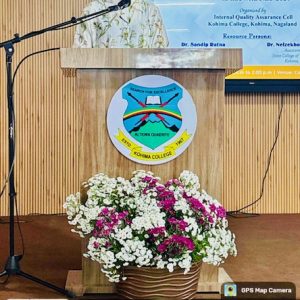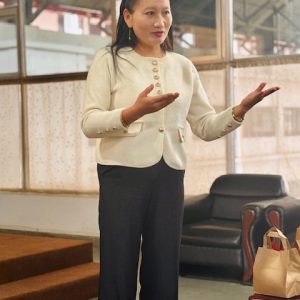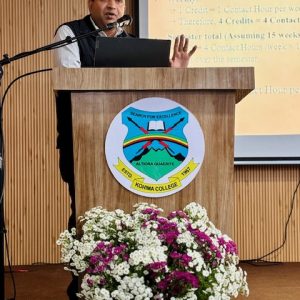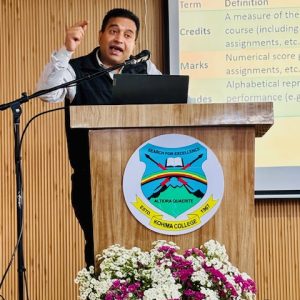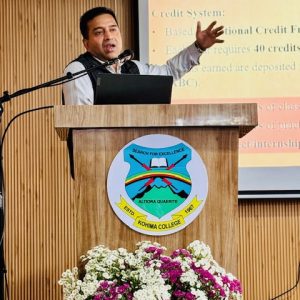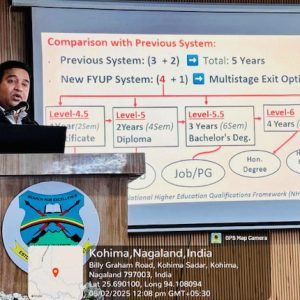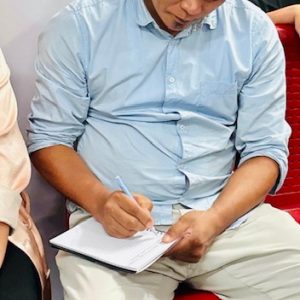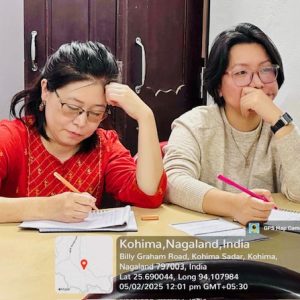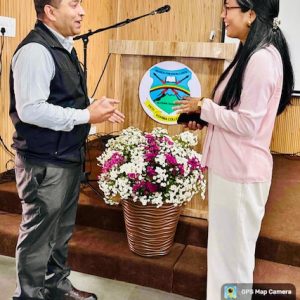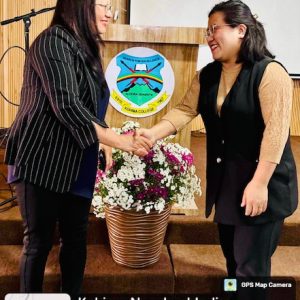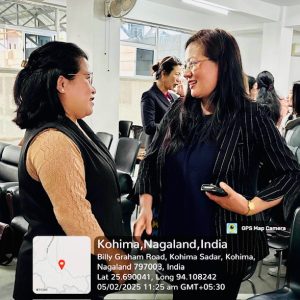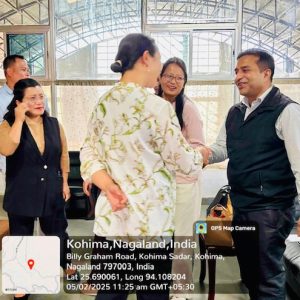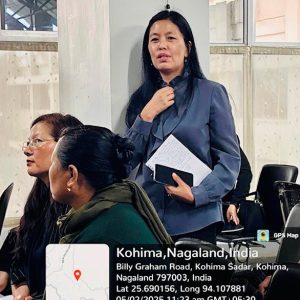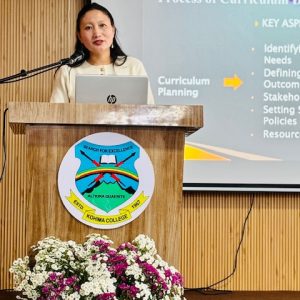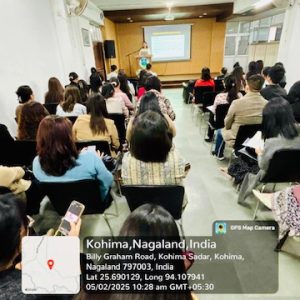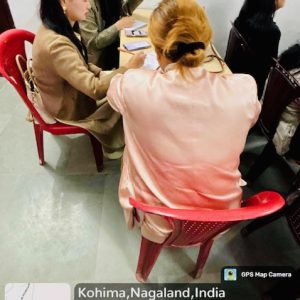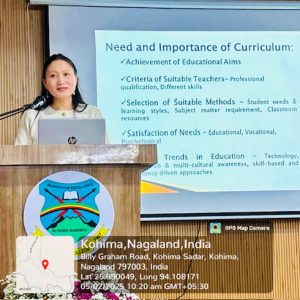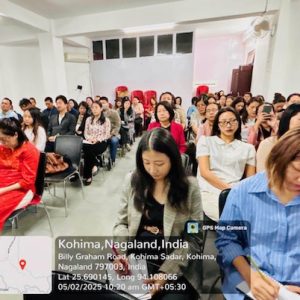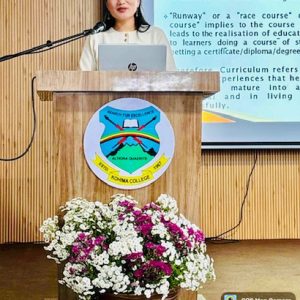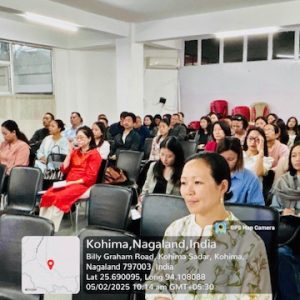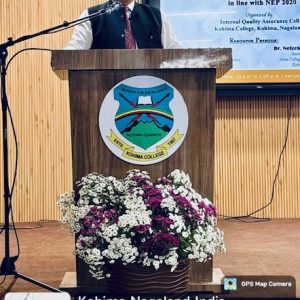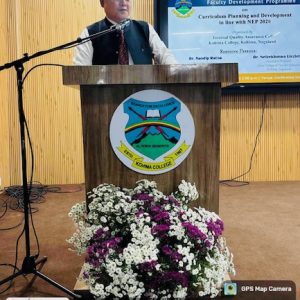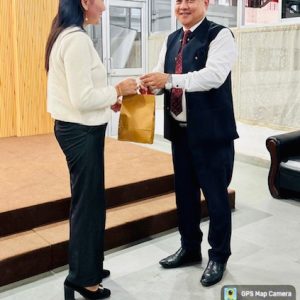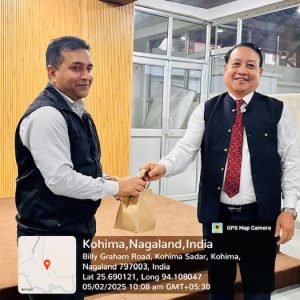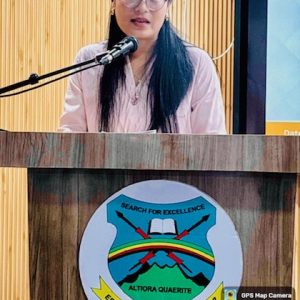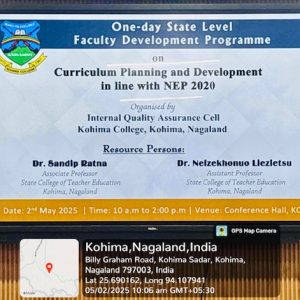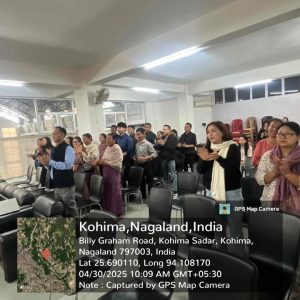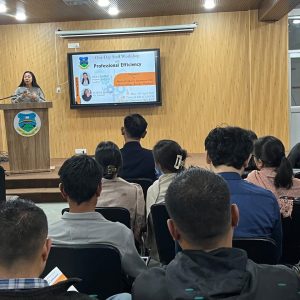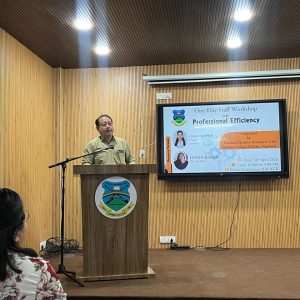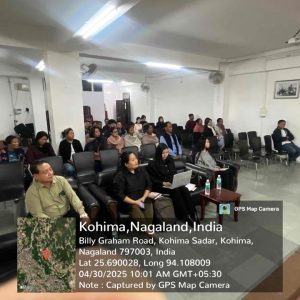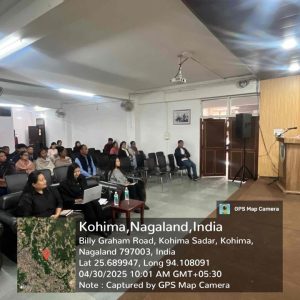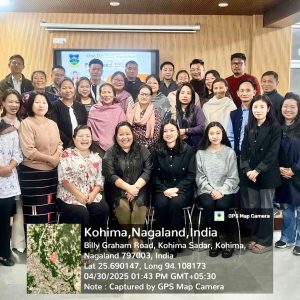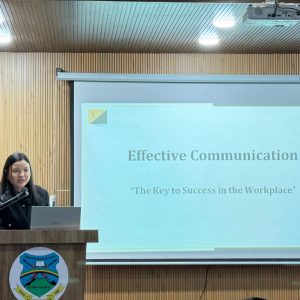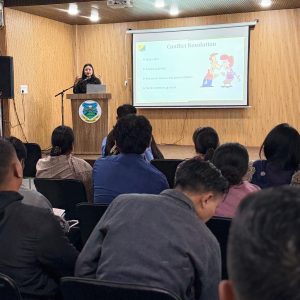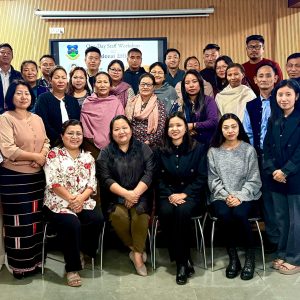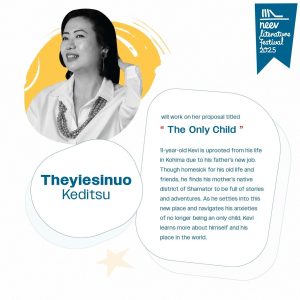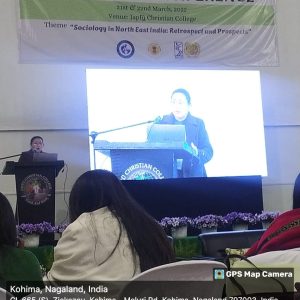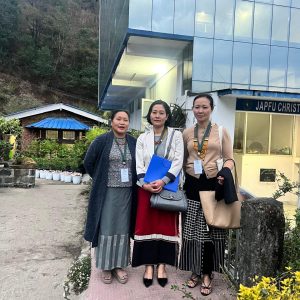June 21, 2025: Kohima College Institutional Seminar
Kohima College, Kohima, successfully conducted its Institutional Seminar 2025 at the college’s Conference Hall. The seminar was organised by the Research and Development Cell, Kohima College, and brought together faculty researchers from various departments who presented papers on diverse themes ranging from ecofeminism to traditional architecture, digital behaviour, political identity, and indigenous language.
The seminar was chaired by Dr. Eunice Alinger, Assoc. Prof. Dept of History, who delivered the opening remarks. She highlighted the increasing importance of research and academic publications in the academic ecosystem, underlining how such platforms help strengthen knowledge, innovation, and scholarly collaboration within institutions.
The first paper was jointly presented by Dr. Limayangla Pongener and Diezenuo Tase, Asst. Professors from the Department of English. Their paper, titled “Eco-Feminism in Folklore about Nature, Foraging and Agriculture among the Angami Women of Kohima Village”, explored the intersection of ecology, gender, and justice. Drawing from folklore, myth, and lived experiences, the presentation aimed to critique patriarchal and capitalist systems while promoting sustainability, equity, and cultural heritage through literature and storytelling.
The second presentation was delivered by Megosie-ü Khate, a member of the Minor Project Team A, funded by the Department of Higher Education. Her paper, titled “Traditional Angami Architecture: A Study of Change and Continuity,” examined the architectural heritage of the Angami Nagas. The study aimed to identify, document, and understand the significance and functionality of traditional structures, the driving forces behind architectural changes, and the resulting impact on contemporary Angami communities.
Next, Dr. Evothung Ezung, Assoc. Prof, Department of Economics and Principal Investigator of Minor Project Team B(also funded by the Department of Higher Education), presented apaper on “The Impact of Social Media on the Academic Performance, Mental Health, and Social Behaviour of College Students in Nagaland.” The study revealed the double-edged nature of social media—while it serves as a useful academic resource and a tool for connectivity, it also poses challenges such as distraction, addiction, and adverse mental health effects among students.
Aosangla Longkumer, Asst. Prof., Dept of Sociology, presented a research paper titled “Voting Behaviour of Undergraduate Students in Students’ Election: An Interdisciplinary Case Study of Kohima District 2024–2025.” This paper was part of an inter-departmental project and delved into the complex nature of student voting behaviour. It revealed how personal values, peer networks, and socio-political identities shape students’ engagement in electoral processes and stressed the importance of connecting democratic ideals to students’ lived realities within academic institutions.
Mhasivilie Zhale, Assoc. Prof, Department of Tenyidie, with his paper “Popular Idioms Related to Hunting of Wild Animals and Birds in Tenyidie.” His study showcased the depth and beauty of the Tenyidie language through idiomatic expressions, particularly those related to hunting. Zhale highlighted how the usage of such idioms reflects wisdom, sharpens communication, and reinforces cultural identity. He urged for the preservation and promotion of indigenous languages and expressions that encapsulate traditional knowledge systems.
Lona Katiry, Asst. Prof, Department of Education, presented a thought-provoking paper titled “Understanding Work-Life Balance and the Influence of Hobbies as an Important Component.” Her research underlined the positive influence of hobbies on mental well-being, stress reduction, social interaction, and personal development, encouraging individuals to view hobbies as essential to holistic living rather than mere pastimes.
Concluding the day’s presentation was Dr. Ketoukhrieü, Assistant Professor, Department of Political Science, presented a paper titled “The Politics of Recognition: A Brief Political History of Identity Assertion among the Tikhir Nagas.” This paper, drawn from her ongoing ICSSR Major Research Project titled “Living at the Periphery: Territory, Culture and Identity of the Tikhir Nagas, a scheduled tribe in Nagaland near the Indo- Myanmar Border”, investigated the assertion of a distinct tribal identity. Her research focused on the political processes behind recognition and identity formation among the Tikhirs and their negotiation through state structures and ethnic dynamics.
The 2025 Institutional Seminar at Kohima College stood out as a dynamic platform fostering academic exchange, interdisciplinary research, and the celebration of indigenous wisdom. Each presentation not only contributed to knowledge building but also highlighted the rich socio-cultural landscape of Nagaland, demonstrating the College’s commitment to both global academic standards and local relevance
June 11-12, 2025: Dr Ketoukhrieü participated at the National Seminar on “Border Dynamics in Northeast India: Challenges, Opportunities & Policy Imperatives”, Baptist College, Kohima
Dr. Ketoukhrie-ü, Assistant Professor, Department of Political Science and IQAC Coordinator at Kohima College, actively participated in the National Seminar on Border Dynamics in Northeast India: Challenges, Opportunities and Policy Imperatives held from 11th to 12th June 2025 at Baptist College, Kohima.
The seminar was organised by the Research and Development Cell, Baptist College, Kohima, in collaboration with the Department of History and Archaeology, Nagaland University. Dr. Ketoukhrie-ü was a distinguished member of the panel discussion on “Border Dynamics in Northeast India: Challenges, Opportunities and Policy Imperatives”.
In addition to her participation in the panel, she also presented a research paper titled “Borderlands as Homelands: Amplifying Indigenous Voices in the Indo-Myanmar Borderlands”, where she highlighted the critical role of indigenous narratives in shaping borderland discourse and policy considerations.
Her contributions added valuable perspectives to the seminar’s interdisciplinary engagement with border issues in Northeast India.
May 30, 2025: Minor Project on “Traditional Angami Architecture: A Study of Continuity & Change”
The Kohima college family extends heartfelt congratulations to the research team on the successful completion of the Minor Research Project titled “Traditional Angami Architecture: A Study of Continuity and Change.” This significant academic endeavor, sponsored by the Department of Higher Education, Government of Nagaland, and diligently monitored by the Internal Quality Assurance Cell (IQAC) of Kohima College, Kohima, stands as a testament to the commitment, scholarship, and collaborative spirit of our faculty members.
The project, led by Dr. Kekhrieseno Christina, Associate Professor, Department of Sociology (Principal Investigator), has been a commendable interdisciplinary effort. She was ably supported by an outstanding team of Co-Principal Investigators:
Dr. Konei Nakhro, Associate Professor, Department of Political Science
Dr. Petevino Chase, Assistant Professor, Department of Environmental Science
Ms. Sungjemienla, Associate Professor, Department of English
Ms. Megosieu Khate, Librarian, Kohima College
We express our sincere appreciation to the team for their hard work and for submitting the final report to the IQAC Coordinator and the Principal, Kohima College, Kohima. Your efforts have brought honor to the institution and added value to the academic community at large.
May 2, 2025: One-Day State-Level FDP 2025 on “Curriculum Planning & Development in line with NEP 2020”
Kohima College, Kohima, successfully hosted a one-day State-Level Faculty Development Programme (FDP) on the theme “Curriculum Planning and Development in Line with NEP 2020” with 74 participants from across different districts of Nagaland. The programme, organised by the Internal Quality Assurance Cell (IQAC), brought together 82 participants from various higher education institutions across the state to engage in meaningful dialogue on curriculum transformation in line with the National Education Policy 2020.
The event commenced with the Chairperson’s address by Dr. Ziuziu Iheilung, Assistant Professor of Functional English, who offered a contextual explanation of the National Education Policy 2020. He emphasized that NEP is a transformative and evolving policy that seeks to redefine the Indian education system by focusing on inclusive, flexible, and forward-looking academic frameworks.
In his welcome note, the Principal of Kohima College, Dr. Vitsosie Vupfu, described NEP 2020 as a dynamic educational reform adopted in 2020, which continues to evolve and adapt. He highlighted the importance the policy places on reviving and integrating the Indian Knowledge System (IKS) and stressed the need for producing knowledge rooted in indigenous traditions and the local context of the state. He pointed out that with limited common-pool resources, collective academic contributions are necessary for the upliftment of higher education, not just for individual benefit but for the advancement of the college and university system as a whole. Such efforts, he added, will enrich students’ knowledge bases and elevate institutional standards—a true win-win situation. He expressed confidence that the FDP would play a key role in helping faculty shape curriculum ideas and equip themselves better, wishing all participants success in the programme.
The first technical session was delivered by Dr. Neizekhonuo Liezietsu, Assistant Professor at the State College of Teacher Education, Kohima. She explored the concept of curriculum as a comprehensive set of learning experiences designed to achieve specific educational goals. She spoke in detail about the need and significance of curriculum, elaborating on various foundational principles such as learner-centric approaches, psychological and logical sequencing, and the importance of flexibility, creativity, and utility. Dr. Liezietsu walked the participants through the curriculum development process, explaining each phase—planning, design, development, implementation, and evaluation. She emphasized that curriculum development is not a static process but a structured and dynamic one that plays a vital role in shaping the educational experience and ensuring that students are equipped with relevant knowledge and skills.
In the second technical session, Dr. Sandip Ratna, Associate Professor at the State College of Teacher Education, Kohima, offered an in-depth presentation on course design for the Four-Year Undergraduate Programme (FYUGP) as envisioned by NEP 2020. He began by comparing the previous academic system with the new structure and provided an overview of key developments introduced in NEP 2020, the Curriculum and Credit Framework for Undergraduate Programmes (CCFYP 2022), and the FYUGP 2023. He explained the shift from marks to credits and grades, and clarified the distinction between major, minor, and elective subjects. Dr. Ratna also discussed credit requirements, program structures, subject choices, and offered examples of course design under FYUGP.
Concluding his session, he offered insightful recommendations tailored to institutions, students, and policymakers. For institutions, he emphasized the importance of clear academic advising and building research guidance capacity at the undergraduate level. To students, he advised beginning with an open mind, exploring interdisciplinary electives, and planning early for research or dual majors, while also utilizing exit options strategically in case of financial or personal constraints. For policymakers, he recommended support for credit transfer, recognition of prior learning, and greater encouragement for collaborative projects, internships, and community-based learning as part of credit-bearing courses.
The event concluded with a vote of thanks by Dr. Theyiesinuo Keditsu, Assistant Professor in the Department of English. All participants received FDP kits and certificates. The programme was well-received and applauded as a timely initiative to equip educators with the tools and understanding necessary to implement NEP 2020’s ambitious academic reforms effectively.
April 30, 2025: One-Day Workshop on “ Professional Efficiency for Ministerial & Non-Teaching Staff, focusing on Improving Workplace Communication, Ethics, Teamwork & Time-Management”
The Internal Quality Assurance Cell (IQAC) of Kohima College, Kohima, organized a one-day workshop on Professional Efficiency for ministerial and non-teaching staff, focusing on improving workplace communication, ethics, teamwork, and time management.
The workshop began with a welcome message from Dr. Ketoukhrie-ü, IQAC Coordinator, who encouraged staff to work together as a family and strive for excellence. She emphasized that the success of the college has come through years of dedication and that such initiatives aim to refresh and uplift staff performance.
The Principal of Kohima College , Dr Vitsosie Vupru, extended appreciation to YouthNet, the training partner, for their consistent efforts in uplifting Naga society. Addressing the staff, he emphasized that no role is too small and highlighted the importance of improving every aspect of college functioning. “There’s always room for improvement,” he stated, affirming the shared responsibility in building institutional success.
An ice-breaker activity by Kelhouwenuo Riipreo- , Programme Facilitator of YouthNet set a participatory tone, leading into a series of sessions facilitated by Lika Chophy and Esther Angami.
The session on Effective Communication explored verbal and non-verbal methods, common barriers, and techniques like active listening and constructive feedback. A round of Chinese Whispers demonstrated the impact of miscommunication.
In Proactive Ownership, staff reflected on accountability and were introduced to a 30-day test to evaluate their proactive behaviors.
The Teamwork session featured group activities and addressed building successful teams through clear roles, trust, and communication.
Work Ethics emphasized punctuality, accountability, and professionalism as essential workplace values, while Time Management introduced the Eisenhower Matrix to help staff prioritize and plan effectively.
The workshop concluded with a Vote of Thanks by Kewetshupe Lohe, Senior Head Assistant.
22 April, 2025: Dr Theyienuo Keditsu, recipient of the Neev Literature Festival 2025
Dr. Theyiesinuo Keditsu, Assistant Professor, English Department, Kohima College Kohima, Nagaland has won the Neev Literature Festival Fellowship for the year 2025. This writing fellowship is awarded to writers of children’s books . Dr. Keditsu will be working on her proposal “The Only Child” for this fellowship, which carries an amount of 6,00,000/-.
21-22, March, 2025: Dr Kekhrieseno Christina, Dr Konei Nakhro & Dr Petevino Chase presented a paper on “Exploring Indigenous Angami Architectural Heritage”
Report on attending the 1st annual conference of the Sociological Association of North-East India (SANEI).
The theme of the conference was, “Sociology in Nort-East India: Retrospect and Prospects”. The conference was held from 21st to 22nd March 2025 at Japfü Christian College (JCC) Kigwema, sponsored by the North-East Council (NEC). A paper on “Exploring Indigenous Angami Architectural Heritage” was presented by Dr. Kekhrieseno Christina, Dr. Konei Nakhro. and Dr. Petevino Chase from Kohima College, Kohima. Dr. Kekhrieseno Christina was also a rapporteur for five sessions.

